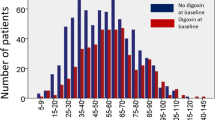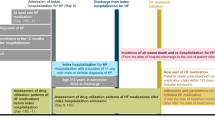Abstract.
Background: As outpatients with long-term chronic illness often show a high incidence of medication noncompliance, we investigated the influence of digoxin noncompliance on hospitalization, left ventricular ejection fraction, and mortality in outpatients in long-term therapy having congestive heart failure with tachycardia at a rate over 100 beats/min before starting digoxin therapy, but abnormal sinus rhythm. Methods: Before starting this study, the digoxin compliance/noncompliance of patients was determined by measuring the serum digoxin concentration (SDC). SDC was determined once a month, followed for six consecutive months, and patients were defined as noncompliant if their SDC was zero (0.0 ng/ml) on at least three consecutive occasions. According to SDC data, 218 patients were assigned to the compliant group and 213 patients were assigned to the noncompliant group. All 431 patients received diuretics, angiotensin converting-enzyme inhibitors, or nitrates as well as conventional therapy with digoxin throughout the trial. The duration of follow-up was 72 months. Findings: After 72 months of follow-up, the digoxin noncompliant patients showed significant increases in the number and duration of hospitalizations compared with the compliant patients. The digoxin noncompliant patients had a marked decrease in the left ventricular ejection fraction from 49.1% to 41.8%. The cumulative rate of mortality from any cause in noncompliant patients was twofold higher (15.0%) than in compliant patients (7.8%; risk ratio when noncompliant was compared with compliant: 1.95; 95% confidence interval 1.11, 3.45; P=0.029) at the 72-month follow-up. The higher mortality in digoxin noncompliant patients was exclusively attributed to worsening heart failure rather than other cardiac and noncardiac causes (risk ratio 2.13; 95% confidence interval 1.12, 4.07; P=0.033). In addition, multiple regression analyses demonstrated that patient noncompliance as well as lower left ventricular ejection fraction at baseline were significantly involved in increased mortality. Conclusion: These results indicate that digoxin noncompliance, at least in part, increases the rate of both hospitalization and mortality due to worsening heart failure in outpatients who have congestive heart failure with tachycardia in long-term therapy.
Similar content being viewed by others
Author information
Authors and Affiliations
Additional information
Accepted in revised form: 18 January 2001
Electronic Publication
Rights and permissions
About this article
Cite this article
Miura, T., Kojima, R., Mizutani, M. et al. Effect of digoxin noncompliance on hospitalization and mortality in patients with heart failure in long-term therapy: a prospective cohort study. Eur J Clin Pharmacol 57, 77–83 (2001). https://doi.org/10.1007/s002280100272
Received:
Published:
Issue Date:
DOI: https://doi.org/10.1007/s002280100272




